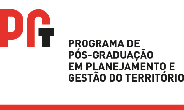Banca de QUALIFICAÇÃO: RAFAEL GUSTAVO SILVA SIQUEIRA
Uma banca de QUALIFICAÇÃO de MESTRADO foi cadastrada pelo programa.DISCENTE : RAFAEL GUSTAVO SILVA SIQUEIRA
DATA : 25/10/2021
HORA: 14:00
LOCAL: Remota
TÍTULO:
Shared mobility and urban mobility public policies in Brazil and in the cities of the Metropolitan Region of São Paulo
PÁGINAS: 120
GRANDE ÁREA: Ciências Sociais Aplicadas
ÁREA: Planejamento Urbano e Regional
SUBÁREA: Métodos e Técnicas do Planejamento Urbano e Regional
RESUMO:
This research is based on theories of sociotechnical systems and aims to enlarge the knowledge about digital transportation platforms in Brazil and in the Metropolitan Region of São Paulo (such as Uber, 99 App, iFood, Loggi, etc.), named “shared mobility”. In the literature review, I show that these platforms reaffirm travel patterns based on individual transportation and with high consumption of fossil fuels. In addition, I present evidences that these platforms have not contributed to the advancement of social justice aspects (in relation to labor practices with drivers) and environmental justice - low carbon transportation (in relation to the modes of transport used). In the hypothesis, shared mobility initiatives were incorporated into public policies without a reflection of the social and environmental practices of digital platforms. Urban mobility public policies, such as the Brazilian Urban Mobility Policy, were unable to accelerate the capacity of the initiatives studied to achieve relevant social and environmental transformations. Through this study, I hope to contribute in listing the needs of urban mobility public policies related to digital transport platforms in Brazil and in the Metropolitan Region of São Paulo.
MEMBROS DA BANCA:
Presidente - Interno ao Programa - 1764378 - SILVANA MARIA ZIONI
Membro Titular - Examinador(a) Externo ao Programa - 1545036 - CLAUDIO LUIS DE CAMARGO PENTEADO
Membro Titular - Examinador(a) Externo à Instituição - FABIO TOZI - UFMG
Membro Suplente - Examinador(a) Interno ao Programa - 2064223 - FLAVIA DA FONSECA FEITOSA
Membro Suplente - Examinador(a) Interno ao Programa - 1790489 - LUCIANA RODRIGUES FAGNONI COSTA TRAVASSOS




